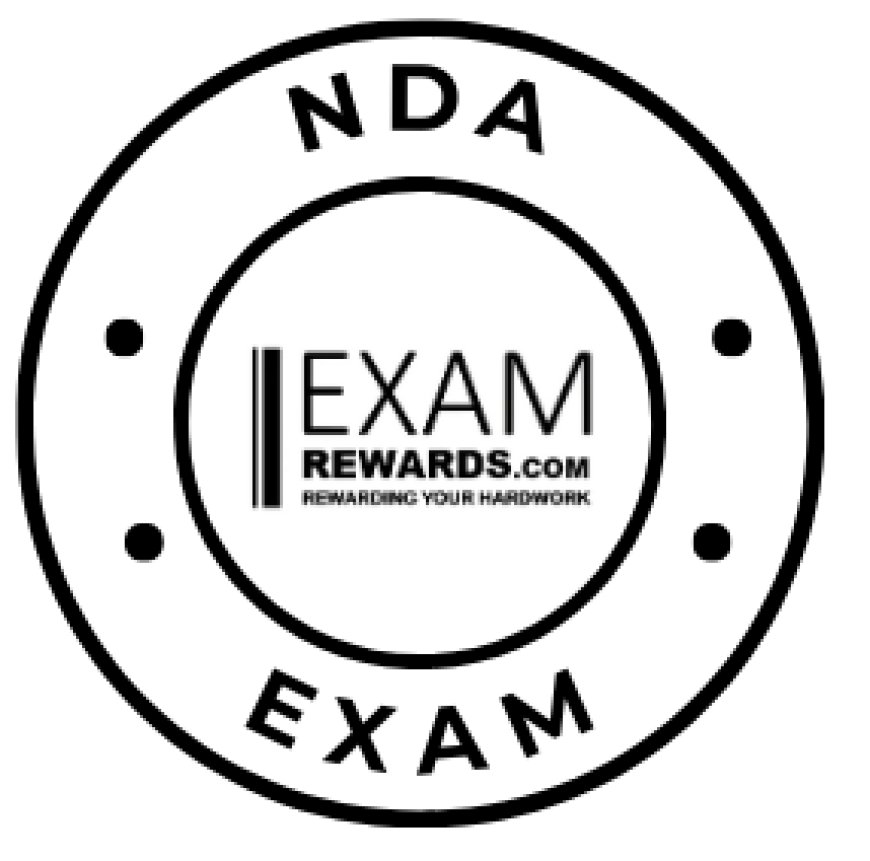The National Defence Academy (NDA)
Video Lectures Notes Mock Tests
The National Defence Academy (NDA)
TABLE OF CONTENT
1. OVERVIEW
2. ABOUT EXAM
3. MODE OF SELECTION
4. ELIGIBITY
5. HOW TO FILL EXAM FORM
6. SELECTION PROCESS
7. SYLLABUS
OVERVIEW-
|
Exam Name |
The National Defence Academy (NDA) |
|
Number of Vacancies |
|
|
Education Qualifications |
For Army Wing of NDA: Candidates must have passed 10+2 (12th grade) pattern of School Education or equivalent examination conducted by a State Education Board or a University. For Air Force and Naval Wings of NDA and for the 10+2 Cadet Entry Scheme at the Indian Naval Academy: Candidates must have passed 10+2 (12th grade) pattern of School Education with Physics and Mathematics conducted by a State Education Board or a University. |
|
Age limit |
Candidates must be between 16.5 and 19.5 years of age. The age is calculated as of the first day of the month in which the course is scheduled to commence. |
|
Registration Date |
|
|
Mode of Application |
Online |
|
Mode of Exam |
Online |
|
Official Notification PDF |
https://nda.nic.in/ |
|
Application Link |
Coming soon |
|
Admit card Link |
Coming soon |
|
Result Link |
Coming soon |
About Exam-
The National Defence Academy (NDA) exam is a prestigious and sought-after examination in India that opens the doors to a rewarding career in the armed forces. Conducted by the Union Public Service Commission (UPSC), the NDA exam is a gateway to joining the Indian Army, Navy, and Air Force. This blog post aims to provide a comprehensive guide to aspiring candidates, outlining the key aspects of the NDA exam, its eligibility criteria, syllabus, preparation strategies, and more. For more Information read full article by examrewards.com
MODE OF SELECTION:-
Written Examination:
· The NDA written examination consists of two papers: Mathematics and General Ability Test (GAT).
· The Mathematics paper tests mathematical aptitude, while the GAT assesses candidates' English proficiency, general knowledge, and logical reasoning skills.
· Both papers are conducted on the same day.
· Candidates are required to score above a certain cutoff to qualify for the next stage.
SSB Interview and Psychological Tests:
· Candidates who clear the written examination are shortlisted for the Services Selection Board (SSB) interview.
· The SSB interview is a comprehensive assessment that takes place over a period of several days. It is conducted by the Services Selection Board.
· The interview process includes various psychological tests, group tasks, individual tasks, and personal interviews.
· The goal is to evaluate candidates' officer-like qualities, leadership potential, communication skills, and ability to work in a team.
· The interview process aims to assess qualities like initiative, determination, courage, and overall personality.
Medical Examination:
· Candidates who pass the SSB interview are subjected to a medical examination.
· The medical examination is conducted to ensure that candidates meet the required physical and medical standards for a career in the armed forces.
· It includes a thorough assessment of physical fitness, vision standards, hearing ability, and overall health.
Final Merit List:
· The final merit list is prepared based on the candidate's performance in the written examination, SSB interview, and medical examination.
· Candidates who clear all stages successfully and are deemed medically fit are included in the final merit list.
· The final selection is based on the candidate's rank in the merit list and their preferences for the Army, Navy, and Air Force.
ELIGIBILITY
Age Criteria:
· Candidates must be between 16.5 and 19.5 years of age.
· The age is calculated as of the first day of the month in which the course is scheduled to commence.
Nationality:
· Candidates must be one of the following:
· A citizen of India
· A subject of Bhutan or Nepal
· A Tibetan refugee who came over to India before January 1, 1962, with the intention of permanently settling in India
· A person of Indian origin who has migrated from Pakistan, Burma, Sri Lanka, East African countries of Kenya, Uganda, the United Republic of Tanzania, Zambia, Malawi, Zaire, Ethiopia, and Vietnam with the intention of permanently settling in India.
Educational Qualifications:
· For Army Wing of NDA: Candidates must have passed 10+2 (12th grade) pattern of School Education or equivalent examination conducted by a State Education Board or a University.
· For Air Force and Naval Wings of NDA and for the 10+2 Cadet Entry Scheme at the Indian Naval Academy: Candidates must have passed 10+2 (12th grade) pattern of School Education with Physics and Mathematics conducted by a State Education Board or a University.
HOW TO FILL EXAM FORM
Step 1: Check Eligibility Criteria Before you begin, make sure you meet all the eligibility criteria mentioned in the official notification for the NDA exam. This includes age, nationality, and educational qualifications.
Step 2: Online Application The NDA exam application process is usually conducted online through the official website of the Union Public Service Commission (UPSC). Follow these steps:
Visit the Official UPSC Website: Go to the official UPSC website (www.upsc.gov.in).
· Registration: Look for the link related to the NDA exam notification. Click on it to access the registration page. You'll need to provide basic details like your name, date of birth, email address, and mobile number to create an account.
· Fill in the Application Form: After registering, log in to your account and fill in the application form. Provide all the required personal, educational, and contact details accurately.
· Upload Documents: You will need to upload scanned copies of your photograph and signature as per the specifications mentioned in the notification.
· Select Examination Centers: Choose your preferred examination center from the list of available options. Make sure to choose a center that is convenient for you.
· Payment of Application Fee: Pay the application fee using the available payment methods (online payment, debit/credit card, net banking). The fee amount and payment details will be mentioned in the notification.
· Review and Submit: Before final submission, review all the details you've entered. Once you're satisfied, submit the application form.
Step 3: Print Application Form After successfully submitting the application form, you'll receive a confirmation email or SMS. It's recommended to take a printout of the application form and payment receipt for your records.
Step 4: Admit Card After the application process is closed, the UPSC will release the admit cards for the NDA exam. You can download your admit card from the official website using your registration ID and password. The admit card contains important details such as exam date, time, and venue.
Step 5: Preparation While not directly related to the form-filling process, it's crucial to start preparing for the exam as soon as you've submitted your application. Refer to the syllabus, gather study materials, and create a study plan to cover all subjects effectively.
SYLLABUS
Paper 1: Mathematics
Algebra:
· Algebraic expressions and identities
· Linear and quadratic equations
· Factorization of polynomials
· Arithmetic, geometric, and harmonic progressions
· Binomial theorem and its applications
Matrices and Determinants:
· Types of matrices, operations, and inverses
· Determinants, properties, and evaluation
Trigonometry:
· Trigonometric ratios, identities, and equations
· Heights and distances
· Inverse trigonometric functions
Analytical Geometry:
· Cartesian coordinates
· Equation of a line and a circle
· Conic sections (ellipse, parabola, hyperbola)
Differential Calculus:
· Concept of derivatives
· Differentiation of elementary functions
· Maxima and minima
Integral Calculus:
· Definite and indefinite integrals
· Basic properties of integrals
· Applications of integration
Differential Equations:
· Ordinary differential equations of first order and their solutions
· Linear differential equations with constant coefficients
Vector Algebra:
· Vectors and scalars
· Addition, subtraction, and multiplication of vectors
· Scalar and vector products
Statistics and Probability:
· Frequency distributions
· Measures of central tendency and dispersion
· Probability concepts and distribution functions
Paper 2: General Ability Test (GAT)
Part A: English
· Grammar and usage
· Vocabulary
· Comprehension and cohesion in extended text to test candidate's proficiency in English.
Part B: General Knowledge
· Physics
· Chemistry
· General Science
· History, Freedom Movement, etc.
· Geography
· Current Events











